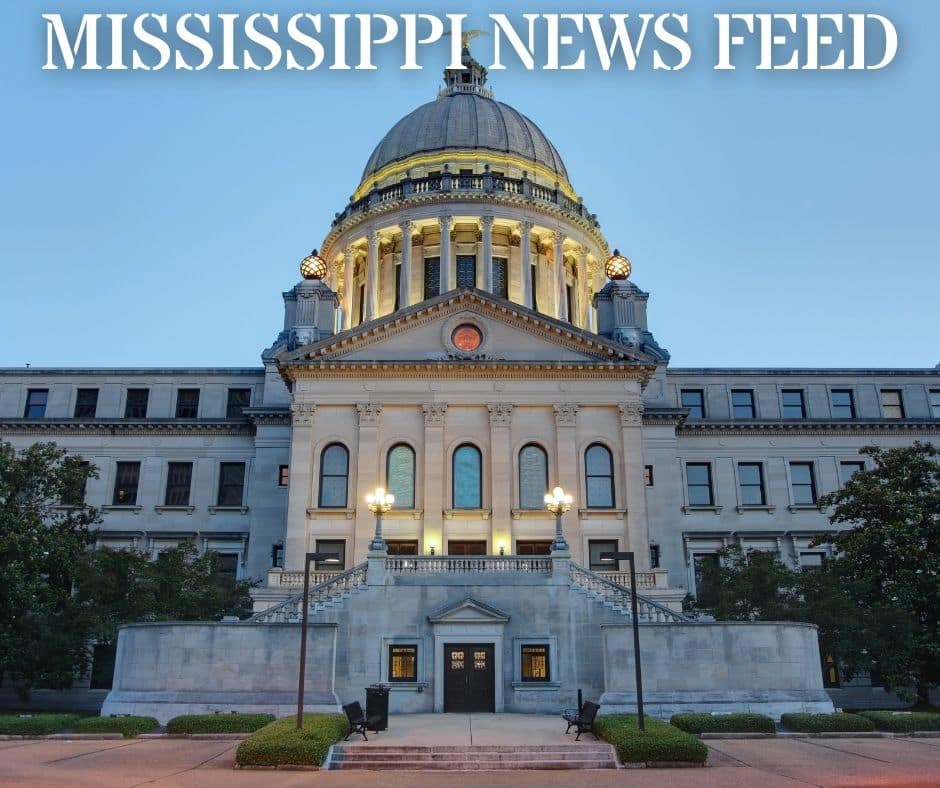Magnolia Tribune
Oppenheimer: The Man Behind the Movie
The story of Oppenheimer and the Manhattan Project is not merely a celebration of American ingenuity. It’s a story that altered the course of human history – a history we now inherit.
“Now I am become Death, the destroyer of worlds.”
(Following is a text version of the July 19, 2023, episode of the RealClearDefense “Hot Wash” podcast with Addison Graham and John Sorenson.)
This weekend, thousands of Americans will go to movie theaters across the country to watch Christopher Nolan’s newest film, “Oppenheimer.” A star-studded cast of talented actors, including Cillian Murphy, Florence Pugh, Matt Damon, and Emily Blunt, will bring to the big screen the life of Robert Oppenheimer, the brilliant theoretical physicist often called “the father of the atomic bomb.”
The story of Oppenheimer and the Manhattan Project is not merely a celebration of American ingenuity. It’s a story that altered the course of human history – a history we now inherit.
Fascinated by Oppenheimer’s story, Christopher Nolan sat down in the spring of 2021 to read “American Prometheus: The Triumph and Tragedy of J. Robert Oppenheimer.” It’s a Pulitzer Prize-winning biography by Kai Bird and Martin Sherwin on the life and career of a man who was treated both as an American hero and later as a traitor.
After finishing the lengthy biography, Nolan spent the summer writing a script based on the book. Co-author Kai Bird has read the script and predicts the movie will be “regarded as unusually historically accurate for a Hollywood film.” For that reason, Nolan says the “story doesn’t leave you with anything too comfortable.”
“But that’s the story we’re telling,” he adds. “It leaves you with resonant and troubling questions.”
If you see the movie this weekend and leave the theater feeling overly troubled, maybe you can slip into an adjacent theater and catch a showing of “Barbie,” a more light-hearted movie that – to Nolan’s apparent irritation – premieres the same weekend as “Oppenheimer.”
But with Russia’s attack on Ukraine posing one of the most daunting threats of nuclear warfare since the Cold War, it may be time for us to contemplate the resonant, troubling questions Nolan raises.
What, if anything, justifies the mass killing of non-combatants? Who shoulders the blame for such carnage? Can nuclear war really be won?
Perhaps we can look for answers through the lens of a man who faced all of those questions and more with the uncertainty of the future hanging over him.
As an enabler of great destruction, Robert Oppenheimer grappled with the many complex political and moral issues that we grapple with in our time. It was a hellish experience for him, one that later caused him to recall a passage of Hindu scripture: “Now I am become Death, the destroyer of worlds.”
What led Oppenheimer to that moment?
On April 12, 1945, while sitting for a portrait, President Franklin Delano Roosevelt collapsed and died of a cerebral hemorrhage. FDR had been a fatherlike figure to a nation that had gone through the Great Depression only to be forced into a two-front war in Europe and the Pacific.
Harry Truman, Roosevelt’s little-known vice president, was sworn in as president later that day. Shortly thereafter, Truman was briefed on a top-secret program that would largely come to define his presidency: the Manhattan Project.
Though Truman had been kept out of the loop as vice president, America’s secret efforts to create a nuclear weapon had begun years before. On August 2, 1939, Albert Einstein signed a letter addressed to FDR, warning that the Nazis might be developing nuclear weapons. Einstein urged the United States to stockpile uranium ore and begin work on its own atomic weapons. As a respected physicist, Robert Oppenheimer was recruited away from the University of California, Berkeley, to work on the Manhattan Project in 1942. By 1943, he was appointed as director of the Los Alamos Laboratory in New Mexico, where the weapons were to be developed. From 200 miles away, he witnessed the first detonation at a test site on the New Mexico plains on July 16, 1945.
The government’s code name for the atomic test was “Trinity.” But the Spanish name for that place was more fitting: Jornada del Muerto, or “Dead Man’s Route.” Shortly after the test, as Oppenheimer was walking with his secretary, Anne Wilson, she heard him mutter under his breath, “Those poor little people! Those poor little people!”
And yet that same week, he instructed airmen on the altitude at which the bomb should be dropped to ensure the most destructive and devastating effect. Three weeks later, the bombs known as “Little Man” and “Fat Boy” were dropped on Hiroshima and Nagasaki, Japan. Many “poor little people” were vaporized.
Japan surrendered. The war was finally over. Oppenheimer became one of the most famous scientists in the world and was largely viewed as an American hero. But he did not feel like a hero. He plunged into a deep depression after the detonation of the bombs as he thought of the destructive powers he had helped unleash.
Three months after the war’s end, Oppenheimer visited Harry Truman at the White House. “Mr. President, I feel I have blood on my hands,” he said.
Truman, according to his own account, replied, “The blood is on my hands – I ordered using the damn thing – let me worry about that.”
Truman later instructed acting Secretary of State Dean Acheson, “I don’t want to see that son of a bitch in this office ever again. He didn’t set that bomb off. I did. This kind of sniveling makes me sick.” At another point, Truman reportedly referred to Oppenheimer as that “cry-baby scientist.”
Truman and Oppenheimer clearly saw the atomic bomb from two distinct points of view. Oppenheimer was worried about the possibility of nuclear weapons ending humanity. But Truman was worried, first and foremost, about ending World War II, the deadliest conflict in human history. Nearly 20 years later, when Truman was asked if he viewed the atomic bomb as a blessing or a curse to society, his thinking on the matter was resolute and unchanging.
“Well I thought it was a blessing,” Truman said. “I thought it could be used and made a blessing. I never worried about its being a curse. I wanted a weapon that could win the war, and it did. That’s what I was interested in.”
The authors of “American Prometheus” documented another scene from the White House exchange between Oppenheimer and Truman. Oppenheimer argued for putting international controls over nuclear weapons. Truman asked, “When do you think the Russians will be able to get such a weapon?” Oppenheimer said likely in the near future but that it was hard to know. Truman interrupted and said, “Well, I know. Never!”
Oppenheimer seemed to grasp what many of his fellow patriots, including President Truman, did not understand: The tremendous power of the atom could not be contained in that way.
The Soviets successfully tested their first nuclear device on August 29, 1949, and the Cold War took on a menacing new dimension.
Oppenheimer was appointed to head the Atomic Energy Commission, a civilian agency in control of nuclear research and the development of nuclear weapons. With his position, he advocated for international control of nuclear weapons to avoid an arms race. His refusal to work on the hydrogen bomb, which would be 1,000 times stronger than the atomic bomb, called his patriotism into question among hardliners, and he became one of the early targets of McCarthyism.
Oppenheimer was accused of being a Communist spy, and by December 1953, President Dwight Eisenhower ordered that a “blank wall be placed between Dr. Oppenheimer and any secret data.” Stripped of his security clearance, Oppenheimer became a pariah. He was humiliated.
Oppenheimer’s political affiliations were known before his involvement with the Manhattan Project, and nobody saw the need to revoke his security clearance. But Red Scare politics spared no one. Politicians and bureaucrats dug up every Communist tie Oppenheimer ever had.
As a young man, Oppenheimer was neither strictly a science nerd nor a political ideologue. He read French literature and Ernest Hemingway, not Locke or Marx. He did not become more involved politically until 1937, when he met Jean Tatlock – a Michigan-born, Stanford-trained psychiatrist – who was an active member of the Communist Party. Tatlock would never agree to marry him, but Oppenheimer’s eventual wife, Kitty, was also a member of the Communist Party. Though Oppenheimer was not a card-carrying Communist himself, he certainly supported the party and even donated as much as $400 to the cause.
But the American Communist Party of the 1930s was not the same as the party of the 1950s. The issues Oppenheimer was known to have cared about were desegregating the swimming pool in Berkeley, California, and improving the working conditions of farm workers. His most passionate cause, one he shared with many contemporary American liberals, was opposing the fascists led by Hitler’s ally Francisco Franco during Spain’s civil war.
Oppenheimer’s biographers are adamant that he was not a Stalin sympathizer or a Soviet spy –but, instead, a motivated American patriot.
Once stripped of his security clearance, Oppenheimer never got it back. He died in 1967. But in 2022, Secretary of Energy Jennifer Granholm nullified the 1954 decision to revoke Oppenheimer’s security clearance. In a statement, Granholm said, “More evidence has come to light of the bias and unfairness of the process that Dr. Oppenheimer was subjected to while the evidence of his loyalty and love of country have only been further affirmed.” He made “profound contributions to our national defense,” she wrote.
It is difficult to know what Oppenheimer would think of his contribution to our nation’s defense if he could see the world today. He feared he helped create a monster that he warned would cause the world to one day curse the names “Los Alamos” and “Hiroshima.”
The fact that he knew the Manhattan Project would have succeeded without him was little solace to a physicist who felt he had blood on his hands. In many ways, Robert Oppenheimer was a casualty of his own weapon.
Uncertainty surrounding the world’s future still looms, and the existence of nuclear weapons only adds to the question marks. But Oppenheimer would likely concur that the world would be far more dangerous if America did not possess nuclear weapons, allowing dictators to intimidate other nations without the threat of American retaliation. Oppenheimer hoped that the existence of nuclear weapons could help to ensure lasting peace in the world. But he knew that the weapon he helped create was also capable of destroying civilization. To stave off such destruction is an ongoing struggle – a struggle that each generation must take up.
After all, as is often said, there are no winners in war. This is especially true in nuclear war. There are no victors. Just “poor little people.”
#####
This article was originally published by RealClearPolitics and made available via RealClearWire.
The post Oppenheimer: The Man Behind the Movie appeared first on Magnolia Tribune.
…
By: Addison Graham
Title: Oppenheimer: The Man Behind the Movie
Sourced From: magnoliatribune.com/2023/07/24/oppenheimer-the-man-behind-the-movie/?utm_source=rss&utm_medium=rss&utm_campaign=oppenheimer-the-man-behind-the-movie
Published Date: Mon, 24 Jul 2023 12:32:09 +0000
Did you miss our previous article…
https://www.biloxinewsevents.com/citizens-and-foreigners/
Magnolia Tribune
Staring mortality in the face at Christmas
My friend Jarrod is dying after an eight year battle with cancer. He’s lived a life worth celebrating, one that has drawn people to Christ.
I was going about my business this week when I received a text that stopped me in my tracks. A college friend was being moved to hospice care.
Jarrod Egley was diagnosed with colorectal cancer in early 2017. In the fall of 2018, tests revealed the cancer had spread to his lungs and Jarrod’s cancer was classified as Stage IV.
For almost eight years from the date of the original diagnosis, he’s fought. Through surgeries, radiation, endless rounds and cycles of chemotherapy, and experimental immunotherapies, he’s fought.

Last year, I flew out to California and spent some time with Jarrod and his wife, Emily. We sat outside one night. He acknowledged to me that it was not a question of ‘if’, but ‘when’ the cancer would claim his life. I told him I was sorry, because what else is there to say?
We talked about our faith, about the trials of Job, about Jacob wrestling with God, about Paul’s affliction. But mostly we reflected on our time together in school, on the good things, and the mundane things, that happened since.
Jarrod and I met at Tulane University. One Sunday morning in the Spring of my freshman year, I rose from my dorm room bed, dressed, and began walking down Saint Charles Avenue in New Orleans with no particular agenda. I walked until I came across First Baptist Church and the thought flickered in the vacuous recesses of my brain to enter.
Some would say it was a lark. The Calvinist in me says providence. The walk that morning changed the trajectory of my time at Tulane and my life on the whole. Intervarsity Christian Fellowship and the Baptist Collegiate Ministry became central to my life and put me in regular league with Jarrod. I met him first at the BCM and we ultimately ended up attending church together.
Jarrod was a faithful servant on and off campus. He helped organize a group of us that would weekly make our way down to the Esplanade seawall on the backside of the French Quarter to feed the homeless. On Friday nights, he could be found at chapel with a small cadre of students foregoing Bourbon Street for early 2000s worship music.
Jarrod was a loyal friend in those years. Never rude or biting. Not prone to an insult for an easy laugh. Persistently encouraging. An engineering student, his mind worked linearly and was oriented to problem solving. There were never a lot of wasted words — always a lot of deliberative questions when he disagreed or did not understand a point. He exhibited intelligence, empathy, and the kind of moral conviction that sets someone apart.
He also had a wry and dry sense of humor and a penchant for beating people at Madden football. He was fair-to-midland on the ultimate frisbee pitch. Along the way, there were crawfish boils, Mardi Gras outtings, poorly attended Tulane football games, and more than a decent amount of wing eating.
After college, I lost touch with Jarrod. He moved back to his home state of California. He got married to his college sweetheart, who could not have anticipated her husband’s journey, but has been a steady and constant helpmate throughout. Jarrod became a very successful engineer and a bourbon connoisseur. One of his bucket list trips took him to Kentucky, where he got to meet and became friends with bourbon “Hall of Famer” Freddie Johnson of Buffalo Trace acclaim.

Sitting in his backyard nearly 20 years after graduating from Tulane, I saw many of the same qualities I had grown to admire when we were students together. I saw a husband who doted on and supported Emily’s passions. But I also saw someone whose body had been beaten to hell and back, who was tired, and who, like Jacob, had been wrestling with God. We quickly fell back into friendship, which perhaps is the mark of good friendship.
We all have aspirations in our youth — for the kind of spouse or parent we might be, for what we might accomplish, for what we might experience. Along the way, dreams are satisfied, modified, or they die on the vine. The clock inevitably works against all of us. That night in Oceanside, California, Jarrod, a numbers guy, saw that time was not on his side. He believed, as we all would, that he still had more to give, more impact to be made, and more things to see and experience.
After that trip, Jarrod and I stayed in touch, most frequently triggered by news of his cancer. It has been mostly the bad variety in recent months. Now spread throughout his body, down to his bones, he has lived in constant pain for months. Not even a steady diet of morphine and an implanted pain pump solve for it. Jarrod’s been hospitalized twelve times just in 2023.
But his matter of fact sense of humor and way of seeing the world remains in tact. So too does his faith that despite these trials, he has always been safe in the hands of Christ.
There are people in the world who believe that life is random, disordered, and without reason. I am not among them. I think my friend is staring mortality in the face at Christmas for a reason.
For thousands of years before Christ came, there was darkness and despair. Sin and shame gripped the hearts of men. Until one holy night, God, in His infinite love, mercy and wisdom, sent His son to save. Jesus is the light of the world and the hope of man. He has won victory over death and Jarrod’s will not be the exception. Jesus came for Jarrod, and for you.
For thousands of years since Jesus’s death, burial, and resurrection, His disciples have been used as divine instruments to point the way to God. Jarrod is among them. If life expectancies were the measure, Jarrod would be at the midway point for most people. He’s made a lifetime of impact for the Kingdom and on other people.
So, to my friend Jarrod, you were placed here with a purpose. You have run your race. You are loved. And when this chapter closes, you will hear “well done, my good and faithful servant.” There is no greater evidence of a life well lived.
While Jarrod and Emily have been fortunate to have health insurance, their portion of the medical bills so far in 2023 have eclipsed $30,000, and Emily is facing additional uncovered expenses during Jarrod’s hospice care, including a night nurse that costs over $400 a night. If you would like to help defray the cost, a contribution can be made at their Go Fund Me page.
The post Staring mortality in the face at Christmas appeared first on Magnolia Tribune.
…
By: Russ Latino
Title: Staring mortality in the face at Christmas
Sourced From: magnoliatribune.com/2023/12/16/staring-mortality-in-the-face-at-christmas/?utm_source=rss&utm_medium=rss&utm_campaign=staring-mortality-in-the-face-at-christmas
Published Date: Sat, 16 Dec 2023 15:05:22 +0000
Did you miss our previous article…
https://www.biloxinewsevents.com/magnolia-mornings-december-15-2023/
Magnolia Tribune
Magnolia Mornings: December 15, 2023
Important state and national stories, market and business news, sports and entertainment, delivered in quick-hit fashion to start your day informed.
In Mississippi
1. Laurin St. Pe’ named CEO of Singing River Health System

The Board of Trustees of Singing River Health System announced the immediate appointment of Laurin St. Pe’ as the Chief Executive Officer on Thursday.
“We are thrilled to announce Laurin St. Pe as the new CEO of Singing River,” said Steve Ates, Board President in a statement. “His wealth of healthcare experience and proven track record make him the ideal leader to steer our health system toward its next phase of growth and success.”
St. Pe’, who has been serving as Interim CEO since July 2023, said he is honored to assume the role of CEO at Singing River. He has worked at Singing River as Administrator of Singing River Health System’s Pascagoula Hospital and Gulfport Hospital, in addition to overseeing program service lines throughout the entire system to his subsequent appointment as Chief Operating Officer of Singing River.
The health system says St. Pe played a crucial role in the financial revitalization of Singing River Health System while steering the organization toward financial stability.
2. Gulfport-Biloxi airport, Stennis evacuated after threats

The Gulfport-Biloxi International Airport was evacuated on Thursday morning “out of an abundance of caution,” airport officials said, after receiving an emailed threat to certain transportation entities across the state.
The airport was thoroughly security swept, cleared and reopened in just over two hours. Gulfport-Biloxi is now operating regularly.
The threat was also sent to Stennis International Airport. Their staff and personnel were also evacuated until the facilities could be swept and cleared.
Any passenger whose travel was affected by the evacuation is encouraged to contact their respective air carrier.
3. Cassidy arrested in Iowa for beheading Satanic Temple statue
Former Mississippi congressional and legislative candidate Michael Cassidy was arrested this week in Iowa for beheading a statue at the state’s Capitol erected by The Satanic Temple.
Cassidy reportedly decapitated the statue and turned himself to police on Thursday. He was charged with fourth degree criminal mischief. He then started an online legal defense fund where he’s raised upwards of $20,000 as of Thursday night, according to his X account.
4. “Serial fraudster” ordered to cease offering investments into companies
According to the Mississippi Secretary of State’s office, on October 26, 2023, Secretary Michael Watson and the Securities Division issued an order against Stephone N. Patton. The SOS says Patton is a serial fraudster with multiple criminal convictions in Mississippi and Florida.
Through business filings with the SEC and Mississippi, Patton has held himself to be the CEO of various companies, including Star Oil and Gas Company, Inc., North Gulf Energy Corporation, Inc., Patton Oilfield Services, Inc., and Patton Farms, LLC.
The SOS says using these business filings and company websites, Patton claimed to have raised hundreds of billions of dollars through investment opportunities. Through investigative efforts and collaboration with the SEC, the SOS discovered none of Patton’s companies are operational, have any assets, or generate any revenues. Account records show Patton spent investors’ funds almost as soon as he received them on personal expenses. The total amount of known investments made to Patton’s fraudulent companies is over $80,000. Further, none of Patton’s investment offerings have been registered or notice filed with the Mississippi Secretary of State’s Office.
The SOS order requires Patton to cease and desist from offering investments with his companies, requiring Patton to permanently deactivate his companies’ websites to prevent any further dissemination of his false or misleading information. Patton is also ordered to pay an administrative penalty of $25,000 to the Mississippi Secretary of State’s Office for these violations, in addition to restitution owed to all his Mississippi investors.
National News & Foreign Policy
1. Congressional retirements mounting as 2024 election cycle nears
Retirement and departure announcements are piling up ahead of the start to the 2024 election cycle. The New York Times has developed a Retirement Tracker that currently shows 22 Democrats and 11 Republicans who are in Congress now will not be seeking re-election next year.
“Dozens of members of Congress have announced plans to leave their seats in the House of Representatives, setting a rapid pace for congressional departures, with more expected as the 2024 election draws closer,” the NY Times reports. “Given Republicans’ razor-thin House majority, the wave of exits has the potential to lead to a significant shake-up next year.”
You can find the tracker here.
2. Texas, Daily Wire, The Federalist sue U.S. State Department over media censorship

The U.S. State Department’s Global Engagement Center has come under fire as Texas Attorney General Ken Paxton along with The Daily Wire and The Federalist have filed a federal lawsuit alleging that the department funded technology that could “render disfavored press outlets unprofitable.” They claim that the department has helped social media – Facebook, YouTube and X (formerly Twitter) – to censor free speech while funding technologies used to censor right-leaning news outlets such as theirs.
New Civil Liberties Alliance is representing The Daily Wire and The Federalist. Paxton and the outlets claim the Global Disinformation Index (GDI), a British think tank, received a $100,000 grant from the State Department in 2021, and NewsGuard, which rates the “misinformation” levels of news outlets, received $25,000 from the State Department in 2020, according to the lawsuit.
According to the State Department’s website, the Global Engagement Center’s mission is to direct, lead, synchronize, integrate, and coordinate U.S. Federal Government efforts to recognize, understand, expose, and counter foreign state and non-state propaganda and disinformation efforts aimed at undermining or influencing the policies, security, or stability of the United States, its allies, and partner nations.
As reported by Reuters, the lawsuit cited a GDI-produced list from December 2022 that ranked The Daily Wire and The Federalist as among the 10 “riskiest sites” for news while the least-risky included The New York Times, Associated Press and NPR. Reuters notes that the lawsuit alleges such “blacklists” are reducing revenues to The Daily Wire and The Federalist along with their visibility on social media and ranking results from browser searches.
Sports & Entertainment
1. SEC releases 2024 schedules

Wednesday evening, the Southeastern Conference released the 2024 football schedules for its member schools, including of interest in the Magnolia State the schedules for Ole Miss and Mississippi State.
It is the first schedule that includes new conference members University of Oklahoma and University of Texas, bringing the conference to 16 schools. Each SEC team will play eight conference football games plus at least one required opponent from the ACC, Big Ten, Big 12, Pac 12 or major independent, each team will have two open dates.
The 2024 season will be the first year the SEC will play a schedule without divisional competition since 1991. The top two teams in the league standings based on winning percentage will play in the 33rd SEC Football Championship Game in Mercedes-Benz Stadium in Atlanta on Saturday, December 7.
2. White, Jesiolowski, Jones honored by MAIS

The Midsouth Association of Independent Schools (MAIS) in Mississippi, comprised of non-public schools, announced this week that Madison-Ridgeland Academy’s senior quarterback John White was named the 6A Player of the Year while Hartfield’s Reed Jesiolowski and Hartfield Chris Jones were named the MAIS 6A Offensive and Defensive Players of the Year, respectively.
All three have committed to play college football at the University of Mississippi.
White is Mississippi’s all-time leader in career passing yards with 15,259 yards, a record he broke during the 2023 season.
MAIS, like the Mississippi High School Activities Association (MHSAA) for public schools, is broken down into classifications, from 1A to 6A. However, MHSAA added a 7A this season.
Markets & Business
1. Consumer retail sales up as energy, gas prices move down

The U.S. Bureau of Labor Statistics reported this week that the Consumer Price Index rose 0.1% in November after being unchanged in October. Retail sales rose 0.3% in November after rising 0.2% in October, meaning consumers continue to spend at the start of the holiday season.
The CPI or inflation rate is 3.1%, higher than the Federal Reserve target of 2% but below the 9% peak in 2022 which reached a 40-year high.
As for the energy index, BLS reported that it fell 2.3% in November after decreasing 2.5% in October. The gasoline index decreased 6% in November, following a 5% decrease in the previous month.
The index for fuel oil fell in November, decreasing 2.7%. However, the natural gas index rose 2.8% over the month after rising 1.2% the previous month. The index for electricity also rose 1.4% in November, after increasing 0.3% in October.
The energy index fell 5.4% over the past 12 months. The gasoline index decreased 8.9%, the natural gas index declined 10.4%, and the fuel oil index fell 24.8% over this 12-month span.
2. Week’s market rally continues into Friday
At close of trading on Thursday, the U.S. markets continued the week’s rally, pushing the Dow up 158 points to 37,248 while the Nasdaq and S&P also made gains, 27 points and 12 points, respectively, to close at 14,761 and 4,719.
The record high for the Dow on Thursday moved futures up 102 points.
According to CNBC, the major averages are headed for their seventh straight positive week. As of Thursday, the Dow is higher on the week by 2.8%. The S&P 500 is up by 2.5%, while the Nasdaq Composite rose 2.5% this week.
Stocks rallied after the Federal Reserve left rates unchanged this week while members look towards cuts in the new year and beyond.
The post Magnolia Mornings: December 15, 2023 appeared first on Magnolia Tribune.
…
By: Magnolia Tribune
Title: Magnolia Mornings: December 15, 2023
Sourced From: magnoliatribune.com/2023/12/15/magnolia-mornings-december-15-2023/?utm_source=rss&utm_medium=rss&utm_campaign=magnolia-mornings-december-15-2023
Published Date: Fri, 15 Dec 2023 13:00:00 +0000
Magnolia Tribune
New water rates expected in Jackson come 2024; those who don’t pay face shut off
Interim Third-Party Director Ted Henifin said this week that only about 59% of the City of Jackson’s water customers are paying their bills.
JXN Water has announced new rates and fees coming in 2024. Those who are not paying will be at risk of shut offs.
The company, which was established by federal appointed interim Third-Party Director Ted Henifin, has been overseeing the city’s water system for the better part of a year.
Officials estimated that the average cost for water in the city was $76 per month for residents. Henifin clarified that JXN water will not attempt to recoup any charges prior to November 29, 2022, and will work with those who have failed to pay since that time.
He said only about 59 percent of the city’s water customers are paying their bills.
“You can’t forgive bills, so we have to be creative in how we part that,” said Henifin in reference to Mississippi’s laws that prevent giving away water.
According to a release by JXN Water announcing the rate changes, residents in single family households with small meters that use up to 748 gallons daily would see a bill increase of roughly .30 cents per day. Research indicates that the average U.S. family uses 300 gallons per day.
SNAP customers will have a new rate tier that could lower their bill by up to .69 cents per day, on average.
“Those who need to save the most benefit from saving money by drinking tap water. This new rate structure makes water affordability possible for 12,500 JXN Water customers who receive SNAP benefits,” said Henifin in the release.

Read more about the anticipated rate changes here.
New fees will also be implemented, including a new service fee of $50, service deposit of $100, returned check fee of $25, service restoration fee of $100, and meter tampering charge of $500.
JXN Water has continued to encourage residents to use the water, with Henifin going on the record in a federal status hearing saying that the water “was safe to drink.”
More conversation regarding the billing process is expected to come at next week’s Jackson City Council meeting.
The post New water rates expected in Jackson come 2024; those who don’t pay face shut off appeared first on Magnolia Tribune.
…
By: Sarah Ulmer
Title: New water rates expected in Jackson come 2024; those who don’t pay face shut off
Sourced From: magnoliatribune.com/2023/12/15/new-water-rates-expected-in-jackson-come-2024-those-who-dont-pay-face-shut-off/?utm_source=rss&utm_medium=rss&utm_campaign=new-water-rates-expected-in-jackson-come-2024-those-who-dont-pay-face-shut-off
Published Date: Fri, 15 Dec 2023 20:00:00 +0000
-

 Local News4 days ago
Local News4 days agoSherral’s Diner to be featured on America’s Best Restaurants
-

 Kaiser Health News5 days ago
Kaiser Health News5 days agoA Closely Watched Trial Over Idaho’s Near-Total Abortion Ban Continues Tuesday
-

 News from the South - Georgia News Feed4 days ago
News from the South - Georgia News Feed4 days agoJose Ibarra found guilty in murder of Laken Riley | FOX 5 News
-

 News from the South - Alabama News Feed4 days ago
News from the South - Alabama News Feed4 days agoTrial underway for Sheila Agee, the mother accused in deadly Home Depot shooting
-

 News from the South - Kentucky News Feed3 days ago
News from the South - Kentucky News Feed3 days agoNicholasville organization activates weather plan in response to bitter cold temperatures
-

 News from the South - Alabama News Feed3 days ago
News from the South - Alabama News Feed3 days agoJudge grants mistrial in Sheila Agee trial due to ‘unhinged juror’
-

 News from the South - Alabama News Feed4 days ago
News from the South - Alabama News Feed4 days agoAlabama's weather forecast is getting colder, and a widespread frost and freeze is likely by the …
-

 Local News1 day ago
Local News1 day agoIntroducing our Student Athlete of the Week: Ocean Springs’ very own Mackenzie Smith




























